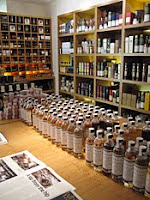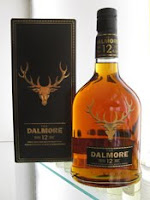 With Christmas fast approaching and the decorations are going up, people are starting to consider (or panic!) about what presents they are going to buy. Whisky is a popular choice and it is a time when people buy whisky either to enjoy themselves over the festive period or to give as a gift. For many shoppers or consumers, it may be the only time in the year that they purchase a bottle of whisky and it can be a daunting experience to go into a supermarket or specialist retailer. The ultimate question is - which one of the vast array of bottles on the shelves is the right one to go for?
With Christmas fast approaching and the decorations are going up, people are starting to consider (or panic!) about what presents they are going to buy. Whisky is a popular choice and it is a time when people buy whisky either to enjoy themselves over the festive period or to give as a gift. For many shoppers or consumers, it may be the only time in the year that they purchase a bottle of whisky and it can be a daunting experience to go into a supermarket or specialist retailer. The ultimate question is - which one of the vast array of bottles on the shelves is the right one to go for?Last Christmas, we wrote an article that tried to help with a few suggestions and things to think about when purchasing whisky as a present. Now, we have re-written and updated this article with further suggestions and new whisky releases. Naturally, the points can be used to buy whisky at any time of the year and not just at Christmas!
What do I need to consider?
It is a common misconception that you as a shopper need to know lots about whisky in order to buy something other than the big popular brands. This is not true. How much you know about whisky is actually not important at all - what has to be considered is what you think you the gift's recipient would like or prefer. If you are not sure, then think what other things and flavours that the person receiving the gift usually enjoys. This can be other spirits, wine, food etc - do they enjoy strong, rich flavours or something lighter and fresher? Do they drink white spirits like gin and vodka or sweeter, heavier ones like dark rum or Cognac? This will give you some clues. It may be that you know a whisky that the recipient of your present likes and you can ask for help in selecting something similar. Also think about if you want a famous brand/distillery or something a bit less well known.
How much do I want to spend?
Your budget is an important consideration. Set an upper limit - any salesman worth their salt will try and get you to spend more but stick to it! Single malt whiskies start around £25 for a 70cl bottle and most will be under or around £50. Blended whiskies can start for as little as £10 (sometimes even less if it is a supermarket own brand). Of course, there are whiskies that can fit any budget, from the cheap and cheerful to those costing hundreds and even thousands of pounds! If you only have a small budget, then you could buy a half sized bottle or a pack of miniatures - many of the companies release special gift packs at Christmas time. You can even buy a single miniature if you just need a stocking filler.
 What are my shopping choices?
What are my shopping choices?There are a few options - specialist whisky retailers, supermarkets, liquor stores and the internet. Specialist retailers, such as The Whisky Shop chain (the London branch is pictured, left) offer a wider range of whiskies and will have knowledgeable staff that can explain the differences and advise you to make the correct decision. These shops can be daunting but if you go in having considered the first two points, then they will be able to recommend you some great choices. They will also generally have some bottles of whisky open that you can sample and this can help you make a better decision.
Supermarkets are different in that they sell the products but staff may not know a great deal about them, especially as many have cut back on specialist wine and spirit staff in the recession. The distilleries marketing departments help you here, as many of them now print basic tasting notes on their packaging and this will give you an idea if you like the sound of it or not. The range will be tighter, although many chains will expand their whisky ranges and offer decent discounts around the festive period.
Liquor stores can vary from the knowledgeable to those that stock whisky but don't know much about it. Knowledgeable stores can be up there in the specialist retail league but the others can still offer some real hidden gems and great bargains, as they may not know what they have (ie - a rare whisky marked at a ridiculously low price). The trick is to pop in for cheaper beer or wine and have a nose around, then do a little research on the bottles you have spied.
With the internet there are many places to buy whisky - some are online specialists, while others are websites of the specialist whisky retailers or supermarkets - and many of these print helpful tasting notes on each page, with some giving more information, customer reviews and distillery facts to help you make your choice.
Our recommendations
If you consider each of the above points before shopping it will make your life, and that of the shop assistant, easier. We are now going to give some suggestions considering each of the points. Most of the whiskies recommended have been reviewed by us and more detailed tasting notes can be reached by clicking on the name of the whisky. We have split the whiskies in to the four main categories to cover the wide scope of flavours and tastes that could be encountered. Naturally, this is not definitive, as there are many nuances of flavour within each category ... but we hope it helps! We have set a budget of £30-35, as this is the most common price point for gift purchases of whisky.
 Light and fresh
Light and freshThis can be described as light, clean, delicate, fresh and crisp so look out for these words on packaging. Key flavour characters may be vanilla, cereal grains, nuts, grassiness (fresh or dried) and floral. Famous examples of this style are the Glenfiddich 12 years old, Glenmorangie Original and Glenlivet 12 years old. You could go for one of these as they are all very good and are some of the best selling whiskies in the world but what if you want something different. There are some very under rated whiskies in this category and ones worth considering included Glen Grant, Speyburn and Glengoyne which all release good 10 year olds. Also, there are the Benriach 12 years old (pictured, above) and AnCnoc 12 years old. For something slightly different, try the Japanese single malt Yamazaki 10 years old.
 Rich and sweet
Rich and sweetThese whiskies are much fuller bodied, sweeter and richer than the previous category. They can be described as thick and creamy and have key flavour words such as caramel, dried fruits and citrus peel, spicy and toffee. The Macallan 10 years old is the best selling and most well known brand of this style of whisky. There are many others worth considering including the Dalmore 12 years old (pictured, left), Glenrothes Select Reserve and Glenfarclas 10 years old, which are reasonably common. The Tomintoul 10 years old and Glendronach 12 years old are harder to find but worth tracking down. If you are wanting something non-Scottish then look towards something like the Bushmills Black Bush or a bourbon such as Bulleit Bourbon or Maker's Mark. Most bourbons would actually fall in to this category, as would the popular Tennessee whiskey Jack Daniel's.
A little bit smoky and peaty
This category is relatively small compared to the others. Generally, they are more robust but not always and have some of the peaty, earthy, smoky flavour and aroma but not as much as the next category. They tend to be from the islands around Scotland, but not always. The most well known examples of this style are the Talisker 10 years old, Highland Park 12 years old and Bowmore 12 years old. Other examples worth checking out include Ledaig 10 years old and Jura Superstition. Some whiskies have just the slightest hint of smoke and many people enjoy these as it is not too overpowering - Clynelish 14 years old, Springbank 10 years old, Tomintoul Peaty Tang and Glenfiddich Caoran Reserve 12 years old.
 Very smoky and peaty
Very smoky and peatyThese are the big, heavy whiskies that are normally from the western Scottish island of Islay (although, again not always!). These will be labelled as rich, peaty, robust, fiery, earthy and smoky. If you see the word 'Islay' on an own brand supermarket whisky then 99.9 times out of 100, it will be in this style. The most famous and best selling brand of this style of whisky is the Laphroaig 10 years old. Laphroaig release another whisky in this £30-35 price bracket that is also very good and this is called Quarter Cask (pictured, left). Other quality whiskies to look for in this smoky style include Ardbeg 10 years old, Caol Ila 12 years old and Smokehead. If you want something smoky but not from Islay, then try the Benriach 10 years old 'Curiositas' from Speyside, Ardmore Traditional Cask from the Highlands or Longrow CV from Campbeltown.
Please note > the present image at the top of this post is taken from www.bargainshopper.com.au.

Thanks for the clear-headed info on whisky gifting. :) Note that while 99 out of 100 Islay malts will have medium to heavy peat, Bunnahabhain is a stand-out exception. I just had a glass of the 12 year old this weekend and was shocked by how un-Islay it is. Light and fruity, sweet, caramelly... I would have sworn up and down that I was drinking a Speysider if it didn't say "Islay" right on the bottle. Also, I recommend the Aberlour a'bunadh as a good gift for an entirely different category: big, sweet and fiery. One of my favorites.
ReplyDelete